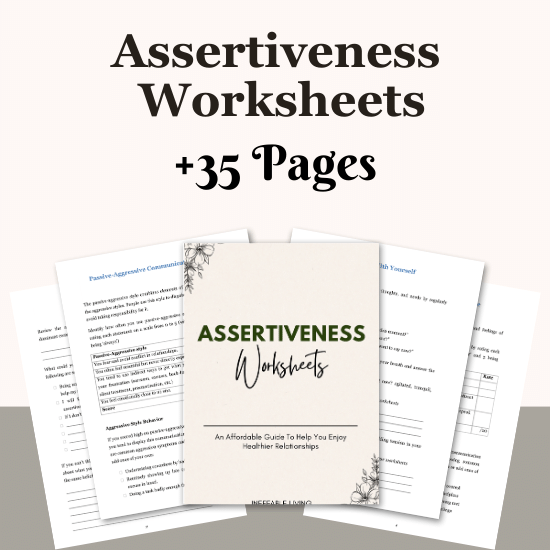This post contains tips for saying no to a narcissist.
How Saying No To A Narcissist Can Be Challenging?
Narcissistic individuals often exhibit traits such as a sense of entitlement, a lack of empathy, manipulative tendencies, and a strong desire for admiration and control.
These characteristics can make asserting boundaries and declining their requests or demands a particularly daunting task.
1. Fear of Retaliation
One of the primary challenges in saying no to a narcissist is the fear of potential backlash or retaliation.
Narcissists may respond to rejection with anger, manipulation, or attempts to undermine your confidence and security.
This fear of negative repercussions can create considerable emotional distress and complicate the decision to assert boundaries.
2. Guilt and Obligation
Narcissists are adept at manipulating emotions and exploiting feelings of guilt or obligation in others.
They may use tactics such as gaslighting, shifting blame, or leveraging past favors to coerce compliance with their demands.
Over time, individuals interacting with narcissists may internalize a sense of guilt or obligation, making it emotionally taxing to resist their requests.
3. Invalidation and Gaslighting
Narcissists often engage in invalidating behaviors, such as gaslighting, where they distort or deny reality, invalidate your experiences, or undermine your confidence in your perceptions.
This can lead to self-doubt and confusion, making it more challenging to assert boundaries and say no.
Related: Am I Being Gaslighted Quiz
4. Desire for Approval and Validation
Many individuals naturally seek approval and validation from others, and narcissists often capitalize on this human tendency.
They may employ tactics to elicit admiration or affirmation, making it difficult to refuse their requests for fear of disappointing them or facing their disapproval.
5. Manipulative Tactics
Narcissists are skilled at employing various manipulative tactics, including charm, flattery, or emotional manipulation, to elicit compliance and override objections.
These tactics can create a coercive atmosphere that makes it psychologically challenging to assert one’s own needs and boundaries.
Best 10 Tips For Saying No To A Narcissist
1. Clarify Your Boundaries
Prior to engaging in interactions with a narcissist, it is essential to establish clear boundaries for yourself.
Reflect on what you are comfortable with and where you draw the line in terms of behaviors or requests that feel intrusive, manipulative, or emotionally taxing.
By having a clear understanding of your boundaries, you can approach interactions with greater clarity and assertiveness.
Related: How To Set Boundaries With A Narcissist?
2. Practice Assertive Communication
Assertive communication involves expressing your needs, desires, and boundaries in a clear, direct, and respectful manner.
When saying no to a narcissist, employing assertive communication can help convey your position with confidence while maintaining a sense of self-respect and dignity.
Practice using “I” statements to express your boundaries, such as “I am not comfortable with…” or “I need to prioritize my own needs at this time.”
3. Prepare Responses Ahead of Time
Anticipate potential requests or demands from the narcissist and prepare your responses in advance.
By having pre-determined phrases or scripts ready, you can mitigate the emotional pressure and coercion that may arise in the moment.
This preparation can provide a sense of empowerment and reduce the likelihood of being caught off guard by manipulative tactics.
4. Set Consequences for Boundary Violations
Clearly communicate the consequences that will ensue if the narcissist disregards your boundaries.
Establishing and enforcing consequences can help reinforce the seriousness of your boundaries and deter the narcissist from overstepping them.
It is important to follow through with the stated consequences if the boundaries are violated, as consistency is key in establishing and maintaining boundaries.
Related: Breaking Trauma Bond With A Narcissist
5. Cultivate Emotional Resilience
Navigating interactions with a narcissist can be emotionally taxing.
Cultivating emotional resilience through self-care practices, mindfulness, and seeking support from trusted individuals can bolster your ability to withstand the potential emotional manipulation or guilt-tripping that may accompany saying no to a narcissist.
6. Recognize Manipulative Tactics
Familiarize yourself with the manipulative tactics commonly employed by narcissists, such as gaslighting, guilt-tripping, or love-bombing.
By recognizing these tactics when they arise, you can validate your experiences and maintain a clear understanding of the underlying dynamics at play, reducing the impact of these tactics on your emotional well-being.
7. Seek External Validation
Given the propensity of narcissists to invalidate or distort reality, seeking validation from trusted friends, family members, or mental health professionals can provide crucial support.
External validation can serve as a reality check, reinforcing your perceptions and empowering you to assert your boundaries with greater confidence.
8. Practice Self-Compassion
Interacting with a narcissist can be emotionally draining and challenging.
Engaging in self-compassion practices, such as positive self-talk, self-care activities, and acknowledging your own emotional struggles, can foster resilience and fortitude in the face of these challenging dynamics.
Related: How To Be Gentle With Yourself? Top 5 Ways To Practice Self-Compassion
9. Limit Exposure and Interaction
In situations where possible, consider limiting your exposure to the narcissist and minimizing interactions that may lead to confrontations or boundary violations.
Creating physical and emotional distance, when feasible, can provide breathing room and alleviate the stress associated with continual engagement with a narcissist.
11. Focus on Self-Validation
In the face of potential invalidation from the narcissist, prioritize self-validation.
Remind yourself that your feelings, needs, and boundaries are valid and deserving of respect.
Practicing self-validation can counteract the undermining effects of gaslighting and manipulation.

Conclusion
Navigating interactions with a narcissist requires a comprehensive approach that encompasses assertive communication, boundary setting, self-care, and seeking support.
By understanding the psychological dynamics at play and implementing these strategies, individuals can foster greater resilience, maintain their sense of self-worth, and navigate interactions with narcissists with increased confidence and agency.



